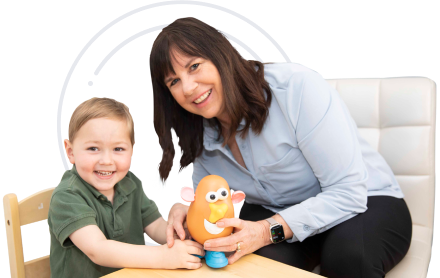Speech Articulation Problems in Kids with Autism
Dr. Mary Barbera
Speech articulation problems in children with or without autism can be affected by their feeding, drinking, and other oral motor habits. By adjusting some of these habits, you can get better speech development and articulation in many of your children and clients.
Today I’m sharing a small excerpt from a podcast episode with speech and language pathologist Dr. Joanne Gerenser where we discuss ways we can help children with speech problems. You can check out the full podcast episode for more of our conversation.
Speech Articulation
Dr. Gerenser came to present in Berks County back in 2000/2001. I was going to take her out to dinner, so I thought I would bring her to my home and have her do a quick 15-minute look at Lucas. The one piece of advice I remember she said was to get rid of the spill-proof sippy cup. That was really key information. I’ve done video blogs on getting rid of bottles and pacifiers and spill-proof sippy cups. There’s a lot of similarities between eating, drinking, sucking problems, and talking problems. This is what Dr. Gerenser had to say about why she recommended this to me and recommends the same to others.
Want to Learn how to Increase Talking & Decrease Tantrums in Children with Autism or Toddlers Showing Signs?
Want to start making a difference for your child or clients?

Dr. Gerenser on Speech Articulation
“We as speech pathologists have taken entire courses on speech development. And we don’t agree all the time, but it’s very scientific literature we have. One of the things we learn is that speech is what’s called an overlaid function. Our tongue and our velum are actually gesticulators as they’re designed to be able to eat. That’s why you see families when they have a baby, go from the bottle or liquids to mushy foods. You don’t just give a two-year-old a piece of steak necessarily. But the progression that we go through when we eat is what helps our articulators.”
The Problem with Sippy Cups
Speech Problems in Toddlers
Eating Habits and Speech Articulation
Dr. Gerenser on Sharing Information
Dr. Gerenser says, “we get to depend on each other to give us different information. There’s a tremendous amount of scientific evidence behind things like speech development and super segmental aspects of speech, lexical processing. There’s a very, very broad literature on that and it’s very scientific. We have to be able to have conversations so that we can decide what we want to include in our interventions. If we don’t, we just cut it out. I’ve been here now going on 38 years. The behavior analysis that I do today doesn’t look at all like what we did 38 years ago. We’re so much better and so much more advanced. You have to stay on top of things. It requires a dialogue.”
Helping Each Other With Speech Articulation
If you want more content on how to improve speech in autism, check out my podcast for more information. You can also attend a free online workshops or take my quiz to find the next steps.
Want to Learn how to Increase Talking & Decrease Tantrums in Children with Autism or Toddlers Showing Signs?
Want to start making a difference for your child or clients?
